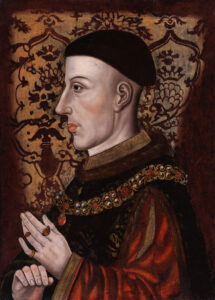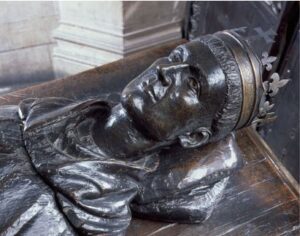
Henry V was fortunate in that he had three brothers to assist him—especially considering he spent most of his reign in France. His relationship with his next brother Thomas, Duke of Clarence, was a bit rocky, but he had to put his personal feelings aside. After all, Thomas was his heir. Once Henry became king, they put their youthful hostilities behind them and Thomas proved to be a strong and forceful leader of men—albeit a little rash at times. When we take a closer look, we see that Henry seems to have wanted to keep him under his direct control; for instance, rarely was Clarence given the opportunity to be regent in the king’s absence (like his other two brothers).
At Harfleur, Clarence led a contingent to the other side of the town from the king; he distinguished himself at the siege to Henry’s satisfaction. In fact, when it came to the time for Harfleur to surrender, they sent representatives to Clarence rather than Henry, hoping to get better treatment. Afterwards, however, when deciding whether to return to England or continue overland to Calais, he argued so aggressively against Henry that the king sent him home. It was said that Clarence was incapacitated by dysentery, but many historians think this was a cover for him to save face, since he went to Calais instead of England. Obviously he wasn’t at Agincourt! When Henry returned to France in 1417, Clarence was prominent in many of the king’s operations, but it was always under the king’s orders.
Thomas was finally given sole command in France the year Henry went back to England with his bride. Finally, he would have the chance to make a name for himself! Unfortunately, at Baugé, he imprudently led an undermanned attack against a Franco-Scottish army, not bothering to wait for his archers. The battle was a crushing defeat that ended in his own death—and advertised to the French that the English were not unbeatable. Henry cut short his progress in England and returned to France so he could reverse the damage done. Did he mourn his brother? There doesn’t seem to be much evidence of this.
John, the next in line, has come down to us as very capable, solid, steadfast, a good warrior and a great leader. On Henry V’s ascension, John was created Duke of Bedford, the name he has been known to posterity. His eleven-year stint as Warden of the East Marches of Scotland gave him solid training to take over as regent when Henry went on his Agincourt campaign, and again in 1417. In late 1416, John was put in command of a fleet to take provisions to Harfleur, already under siege by a combined Franco-Genoese navy. Attacking the besiegers, Bedford fought for seven hours against the formidable Genoese carracks which towered over the English ships. Ultimately, the English were victorious and decisively lifted the siege, and the conflict, known as the Battle of the Seine, once again demonstrated their vaunted invincibility (this was before Baugé).
Humphrey, the youngest brother, was made Duke of Gloucester at Henry’s coronation. He was still unproven at the time of the Agincourt campaign, so he pretty much operated under the watchful eye of the king. He was eager to prove himself and showed quite a knack for managing the artillery, and Henry gave him plenty of opportunity to hone his skills as commander. Although he was seriously injured at the Battle of Agincourt, the king straddled his prone body and defended him until he was dragged to safety. This was to be the only pitched battle Humphrey ever fought in, but he otherwise proved himself a clever and able commander during the subsequent sieges while the king strived to conquer Normandy. On Henry’s last campaign, Bedford fought in France and Gloucester served as regent in England, so he must have demonstrated enough competence to be trusted.

When Henry died in 1422, he appointed Bedford as regent of France and also of England—when he was there. Gloucester’s role was more ambiguous. He was assigned as protector of the baby Henry VI, but the child’s upbringing and education were given to Thomas Beaufort, Duke of Exeter (and Henry’s half-uncle). Gloucester insisted that he should be governor of the realm by right of his birth and his interpretation of Henry’s will. However, the lords in Parliament had other ideas and he had to be satisfied with Protector and Defender of the realm and head of the Council. Humphrey was already demonstrating unsettling tendencies toward self-aggrandisement which would later prove his downfall.
There’s a whole lot more to this story, needless to say, and I intend to devote a whole book to this…probably two novels from now. More research is required!